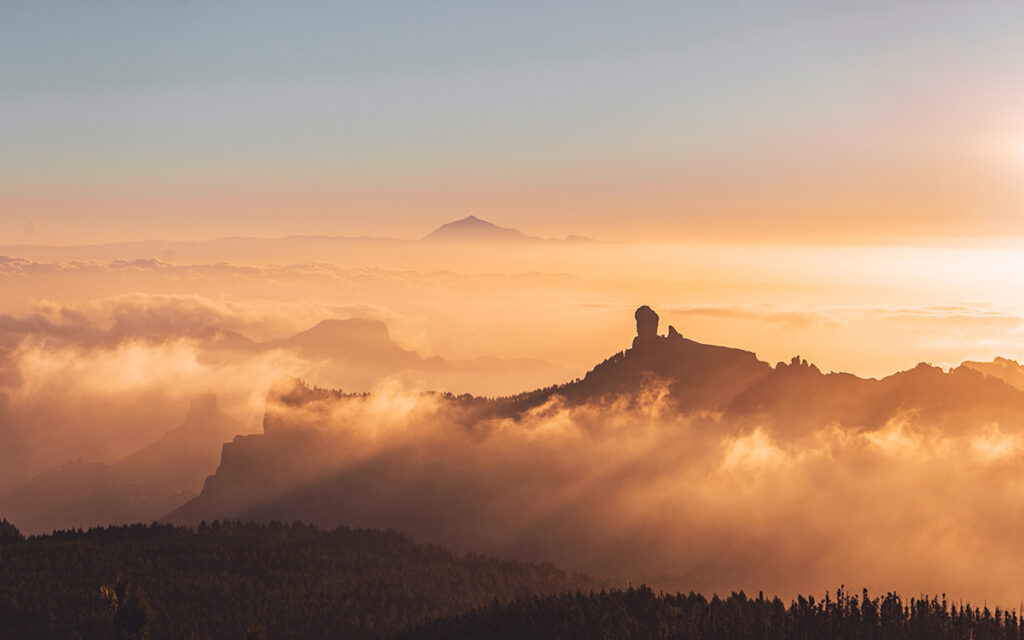The Canary Islands: tourism based on nature
The sand dunes of Maspalomas, the ravine of Fataga, the caves of Acusa Seca and the natural monument of Roque Nublo make the perfect and enhanced recreation of the Continent, the land in which the fantasy universe of the Netflix production takes place.
By: Ramón Oliver
The Canary Islands are one of the most visited destinations in Europe, with 13.1 million international travellers in 2019 alone, compared with a permanent resident population of 2.3 million on 1 January 2020. Tourism in the Canary Islands is redefining itself with a trend that, while not completely new, has certainly become more prominent in the last few years: active tourism.
A spectacular climate, with year-round average temperatures of 22°C and an exceptional natural environment, means that every one of the archipelago’s seven islands are an ideal place to challenge and transcend the classic tourist formula of sun and sand. ‘The pandemic has forced tourists (and locals too) to leave their hotel, to seek out open-air activities and move about in the area where they’re staying’, says Oliver Rodríguez Sosa, CEO and owner of Yukan Outdoor Gran Canaria, a small local business specialised in outdoor athletic activities such as canyoning, rock climbing and kayaking. The business was born from a project proposal that spent three years collecting dust in a drawer before its creator, a lover of nature and open-air sport, rescued them in 2013 and realised that they had the potential to become a reality.
Around 700 businesses in the Canary Islands are dedicated to active tourism
Yukan is one of the approximate 700 businesses now dedicated to active tourism in the Canary Islands. This sector has borne the brunt of the coronavirus mobility restrictions, although, paradoxically, the pandemic has also helped it to attract a clientèle with new profiles.
‘In every activity, we try to ensure that the traveller gets to know a special place on the island and has an experience. Sometimes it will be gentler, sometimes rougher, but always linked to an emotion’, Rodríguez emphasises.
Hiking, cycle tourism, trekking, birdwatching, surfing, mountaineering, paddleboarding, windsurfing, mountain climbing, kitesurfing, stargazing, diving, snorkelling, kayaking, canyoning, caving, paragliding… The options for active tourism in the Canary Islands are as diverse as its incredible natural environment. From the emblematic Teide to wooded zones that seem to have been transplanted by alien forces from some place in central Europe, through seas of desert sand dunes that are on a par with their big brothers in the Gobi or Sahara. ‘The only sports not on offer in the Canary Islands are winter sports (all we’re missing is the snow). We have everything else and, what’s more, they can be enjoyed throughout the year’, boasts Óliver Rodríguez.
Under the sea too
The Canary Islands also offer dazzling undersea treasures. An international Mecca for divers, it also has plenty to offer those who are less sporty or prefer to enjoy this magical experience in a more peaceful manner. Submarine Safaris is a business that has been offering unique aquatic immersion experiences for 25 years in Tenerife and Lanzarote from aboard a real submarine. ‘The idea was to make this unique experience accessible to everyone, an opportunity to dive without getting wet and get to know places that would normally be exclusively reserved for divers’, explains the company’s CEO, Paul Bunce.
The company’s two submarines, designed and built in Finland, have a capacity for 48 passengers and crew, with 22 portholes and two observation decks to allow passengers to gaze out at the sea floor. ‘Our submarines dive up to 30 metres below the surface of the Atlantic Ocean, where there is always a great diversity of sea life’, says Bunce.
Each of the underwater vessels is equipped with six electric motors, making their passage environmentally friendly in terms of emissions. And, as the company points out, it is not just about admiring the undersea beauty, but about ‘raising awareness among the public of the importance of the oceans and the role that they play in our environment’.

Photo: Cristian Palmer, via Unsplash. 
Submarine shipwreck. Photo: Submarine Safaris 
Submarine interior. Photo: Submarine Safaris
Raising awareness
Efforts to raise awareness are especially important now that the different types of ecotourism are becoming more popular. In this sense, Óliver Rodríguez warns that the increase in active tourism also has its dark side. ‘Spaces in nature where we usually work completely alone in the last year have become damaged by music, rubbish and various shortcuts on the footpaths’. The creator of Yukan underscores the importance of respect and education for these types of activities. ‘It is important to teach travellers to respect nature and help them become aware of the fragility of the ecosystem they are visiting’.
‘It is important to teach the visitor to respect nature and help them become aware of the fragility of the ecosystem they are visiting’
Are nature and tourism incompatible? On the contrary. This type of active ecotourism could represent an opportunity to place value on other forms of interaction between these two concepts. One way of developing ‘responsible tourism in which the traveller gets to know the environment, relates to it, soaks it in with a little of the love for nature that those of us who are lucky enough to work with it feel’, concludes Óliver Rodríguez.
Is there also a slogan for this way of understanding tourism? The Yukan founder proposes one: ‘Try to leave the place you visit better than when you found it’.

Photo: Canary Ride, via Unsplash. 
Photo: Bastian Pudill, via Unsplash. 
Photo: Jorge Fernández Salas, via Unsplash.




